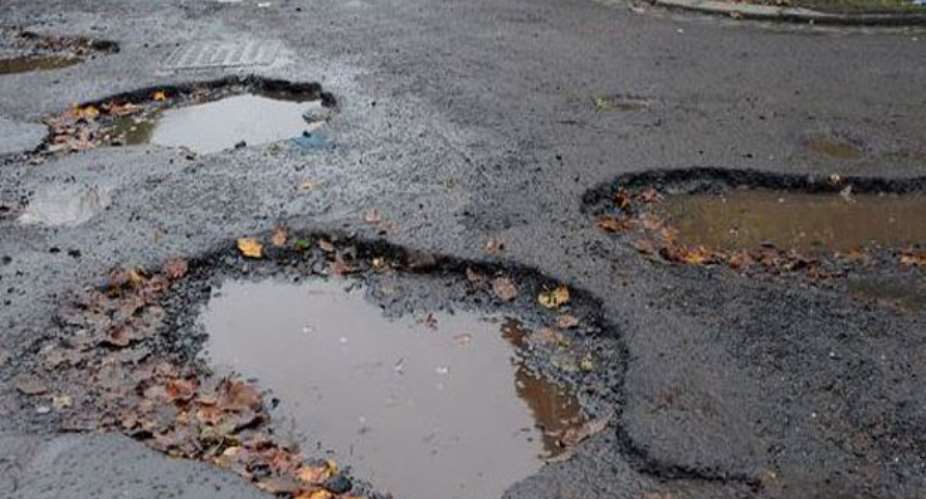Elsewhere in this edition, there is a story about the gradual mending of potholed Accra roads. The idea of asphalting these roads, some of which were neglected for a long time and whose crater-grade potholes were treated to occasional filling with gravel, is commendable.
As we commented sometime ago, roads in Accra are really terrible, their level of degradation varying from place to place. The roads in the Ayawaso Central Constituency, especially in the general area of the Malata Market and around Alajo, are just beyond comprehension. Sometimes, we wonder whether those who are supposed to ensure that our roads are in good shape have an idea about their state.
We know for sure that the professional men and women in the Department of Urban Roads are aware of the sorry state of these roads but who are they to initiate repairs when neither the politicians at the helm have given them the nod nor released the appropriate funding for the works. To put it alternatively, 'they have not released the funds.'
Today, however, the change that Ghanaians yearned for and, indeed, voted for is being reflected in a somewhat aggressive upgrading of our roads in the nation's capital.
The road network in every city tells a lot about the quality of its managers who in this case are not the road engineers but the politicians who must take the decision to authorise the upgrade.
It is our hope that the works we are witnessing would be extended throughout the city. This done, we would urgently ask that the drainage system in the city be considered and the covering of gutters in line with best practices adopted as a matter of policy, otherwise the pre-independence state of affairs would remain with us even when the rest of the world has gone beyond that.
We won't pretend not to know that asphalting is very expensive relative to the coal tar and chippings module. For the government to show preference for it as it is doing suggests a belief in the quality of this mode of road construction.
We have observed, as a matter of urgency, however, the absence of maintenance culture on the part of both the authorities and the citizenry.
The assigns of the state responsible for maintenance of roads and other services such as water would not turn up immediately when their attention is needed to respond to emergencies such as leaking water from a damaged water pipeline or a small damage in the road network. Such attention, especially in the case of developing potholes on roads, would save the situation from deteriorating further. The small damage would widen and cost more to mend when not responded to.
It is our position, therefore, that that given the high cost of road construction, especially asphalting, no time should be wasted in mending small dents on the roads in which so much public funds have been pumped into.
On the part of the citizenry whose responsibility for the maintenance of the roads cannot be overemphasized, more is expected. Indeed, the current state of affairs is inappropriate and the earlier we changed our attitude to state issues, the better.
Some mechanics have turned portions of these asphalted roads into their workshops, the spent lubricants allowed to drip on the roads and reducing their longevity.
A public education about what damages these roads should be mounted. Those who after this are found to be acting in breach of the road maintenance culture should be sanctioned.





 Former Kotoko Player George Asare elected SRC President at PUG Law Faculty
Former Kotoko Player George Asare elected SRC President at PUG Law Faculty
 2024 elections: Consider ‘dumsor’ when casting your votes; NPP deserves less — P...
2024 elections: Consider ‘dumsor’ when casting your votes; NPP deserves less — P...
 You have no grounds to call Mahama incompetent; you’ve failed — Prof. Marfo blas...
You have no grounds to call Mahama incompetent; you’ve failed — Prof. Marfo blas...
 2024 elections: NPP creates better policies for people like us; we’ll vote for B...
2024 elections: NPP creates better policies for people like us; we’ll vote for B...
 Don’t exchange your life for wealth; a sparkle of fire can be your end — Gender ...
Don’t exchange your life for wealth; a sparkle of fire can be your end — Gender ...
 Ghana’s newly installed Poland train reportedly involved in accident while on a ...
Ghana’s newly installed Poland train reportedly involved in accident while on a ...
 Chieftaincy disputes: Government imposes 4pm to 7am curfew on Sampa township
Chieftaincy disputes: Government imposes 4pm to 7am curfew on Sampa township
 Franklin Cudjoe fumes at unaccountable wasteful executive living large at the ex...
Franklin Cudjoe fumes at unaccountable wasteful executive living large at the ex...
 I'll 'stoop too low' for votes; I'm never moved by your propaganda — Oquaye Jnr ...
I'll 'stoop too low' for votes; I'm never moved by your propaganda — Oquaye Jnr ...
 Kumasi Thermal Plant commissioning: I pray God opens the eyes of leaders who don...
Kumasi Thermal Plant commissioning: I pray God opens the eyes of leaders who don...
